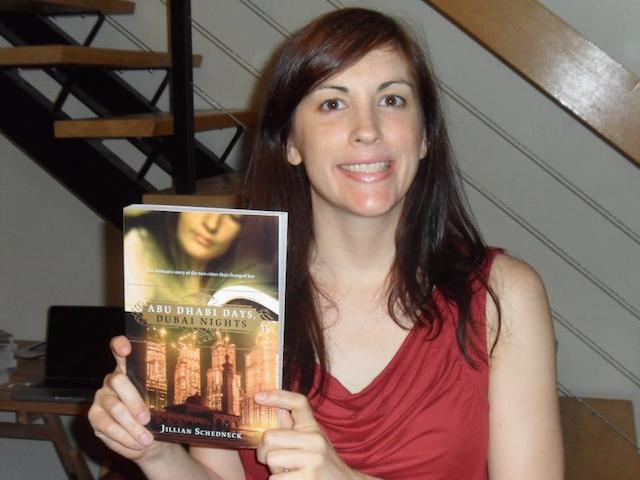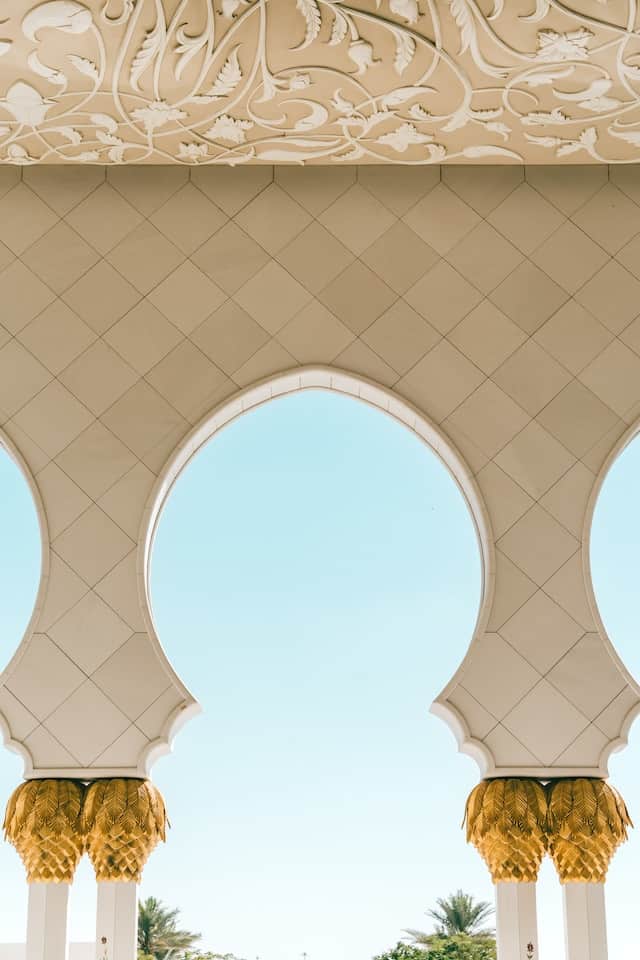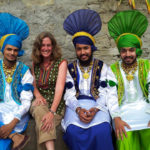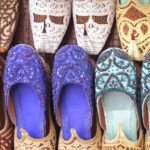Abu Dhabi Days, Dubai Nights: A Conversation With Author Jillian Schedneck

Jillian Schedneck is the author of Abu Dhabi Days, Dubai Nights, an honest, gripping memoir that recounts the story of her two years as a professor in the United Arab Emirates, and the complexities of Dubai. Pink Pangea had the pleasure of speaking to her about memoir writing, her post-Emirati life, and her favorite works of literature.
First, I want to ask you about Abu Dhabi Days, Dubai Nights. In the memoir, you speak honestly and candidly about your impressions of people you met. Did all of those people end up reading your memoir, and how did they take it? Were you ever afraid to write about them out of fear that they would be upset?
I entered into the writing process very clear about one thing: I wasn’t going to worry about what people thought of what I wrote until I decided that my writing was at a publishable level. I didn’t let my fears of other people’s reactions inhibit me from writing the story I wanted to tell.
However, I made an exception for Aysha (not her real name, but she chose this as her name for the book) because her situation was sensitive and I needed to honour that. I asked her what was okay and what was not okay to write about before I even started. Another name I changed was Andres, who is featured as the main love interest in the beginning of the book. At one point once I started writing the book, he told me that I could use his real name, but there was no way I was going to do that. I didn’t even think about whether or not he would want me to use his real name.
I changed it for me, to give myself some distance and a bit of clarity in the writing of it. And that trick really worked. Frankly, I never imagined Andres reading it, and I would be very surprised if he has. This freed me to write honestly about our relationship. And of course I wanted to be fair to him, whether or not he would ever read the book.
While writing it, I painfully and painstakingly went through our old emails and found that at times, I was just as much at fault as he was. The distance I got from using another name helped me to acknowledge that, and not just blame him for everything that went wrong in our relationship.

Many of my friends in the book, such as Shenila and Bethany, loved their portrayals, as did Nizar, who is a musician featured at the end of the book. At first he was afraid to read about himself, but here’s what he said after he finished it (yes, I save ALL my emails!):
Its 545 AM, and I haven’t slept yet as I read the last 100 pages in one stretch. I wish that all humans could just pop out a disk from their brains that could describe their experiences in the way you have. Life is a beautiful journey, and being able to replicate it is true magic. I want to achieve musical works as magical as what I just read.
You describe so many minute details of your journey in the memoir, such as an advertisement on a billboard. How did you remember so many intricate details? Do you take notes as you are out and about?
I did start taking notes when I moved to Dubai, which were actually very unhelpful. I mainly wrote a diary of my emotions. I was, for the most part, frustrated by my job and my students, which was certainly not something I wanted to focus my book on. Even though these emotions were prevalent in a day-to-day sense, and I did write about my students, these were not the details that I wanted or needed to include in my book.
So, as for the details I did include in my book, some of them were so embedded in my brain that I simply remembered them. I must have passed those advertisements on Sheikh Zayed Road hundreds of times, and I always thought about their target audience and the kind of associations those companies were trying to create.
I really felt hyper-alert when I was there, especially when everything was so new and foreign, and I’m sure I’m not alone in that feeling. For other details, I watched YouTube videos and searched Google Maps and websites to jog my memory.

After living in the Emirates for two years you returned to the U.S. to write the memoir. When did you realize you wanted to write it? When and how did you connect all of the experiences you had in the country to form it?
I was frustrated with my job and some of the experiences I had at a women’s shelter called City of Hope, and decided I wanted to have a bigger voice and to tell the story of my experiences in the UAE. I had toyed with the idea for a while, thinking of it as something I would do in the future. My experience at City of Hope solidified the decision.
In order to connect my experiences to form an entire narrative, I tried to balance my personal, romantic life and my professional, teaching life. These two parts of my life were very compartmentalized in the UAE, especially in Abu Dhabi.
Abu Dhabi Days, Dubai Nights: A Conversation With Author Jillian Schedneck
From day to night, I felt like a different person, going from English language instructor in drab, long clothes to young expat going out for a drink with my expat girlfriends and Arab guy friends. In order to connect those disparate aspects of my experiences, I wrote about them directly, trying to capture the feeling of compartmentalizing myself.
I was very concerned about achieving a good ‘flow’ to my narrative. So I would write about my experiences teaching the women on the female side of Abu Dhabi University, and weave in something about my personal, romantic life within that chapter as well. Then the next chapter would usually focus on my personal life, to get back to speed with that aspect of my life. I tried to focus it roughly in the right time-frame, with each chapter representing a central theme or story, such as teaching on the male side of the university, or visiting Dubai, or Andres moving in with me.
I wrote more about some of the wrong and right things I did while writing Abu Dhabi Days, Dubai Nights on my blog.
In many ways, your experience in the country was unique to the time and place. On the last page of your book, you write “If I ever came back, I imagined, Dubai would be like a new city, not mine anymore. And once again, this new place would change me, help me remember who I was then and see myself anew.” Because of your PhD research, you have since returned to the city. What was the return like, and how did it impact you? Was it the same as you imagined?
Being back in Dubai was quite surreal. When I returned, it had been three years since I left. I had this crazy fear that they were going to turn me away at immigration. I’m not sure why! But they let me in along with everyone else, and I hopped in a taxi with a female driver, a rare occurrence. This was my first clue that a few things had changed in the three years I’d been away.
In many ways, Dubai was a much friendlier, more accommodating place. Many of the people I spoke to said that after the global financial crisis, life in Dubai was quieter, and the expats who stayed were the ones who really cared about the city. I could see this in the community projects starting up and the new cafes that seemed to rely on developing a local customer base rather than only catering to tourists.
Another huge change was the Dubai Metro. I had watched it being built when I first moved to Dubai, but missed its opening. The Metro totally changed the way I interacted with the city for the better. I would ride the length of Sheikh Zayed Road for a fraction of the cost of a taxi.
The Metro just allowed me to get up and go whenever I wanted. Standing in the female carriage with the Filipino nannies and African businesswomen and wealthy Arab ladies, listening to all the different languages swirling around me, I would think about how far I’d come from that shy girl growing up in the New Jersey suburbs. Back then, I would have never imagined myself here. It was a joy to realize again and again that such change was possible, and that an idea for a research project brought me back here.
Abu Dhabi Days, Dubai Nights: A Conversation With Author Jillian Schedneck.
It was also very different experience this time around because I was interviewing young Emirati artists for my PhD project. It was fascinating, and draining, to do these interviews, and I was lucky enough to get forty participants. I found that the young people I contacted were so eager to talk to me and give of their time and opinions. It was such a pleasure.
Life was also very different for me as a 31 year old who had just entered into a serious relationship with the man who is now my husband. I was much more grounded than I had been the first time! I still went out a lot and saw my friends, but I wasn’t seeking something, either for my book or my personal life. I felt I had found what I was looking for, and it was back in Adelaide.
The memoir speaks of how you stepped beyond the expat circle and just scratching the surface of Emirati culture to delving into its complexities, both good and bad. What advice do you have for other travelers who aim to do the same wherever they are?
My advice is to choose a job that enables you to work alongside and/or serve the local people. That was the only way I was able to meet so many Emiratis in the UAE. Other expats I met would pepper me with questions whenever I mentioned that I taught Emirati university students, because they were so curious about these people that they never interacted with. If I had gotten another kind of job, such as in finance or accounting, I too would have had trouble meeting Emiratis. As one of my interview participants put it, ‘there just aren’t enough of us to go around.’ And that’s true.
Emiratis only make up 12% of the population. So it stands to reason that in the UAE, it will be more difficult to interact with locals. Of course, this is a very unique circumstance, and in other locations it would be easier to interact with local people.
You never know if that new expat friend has a lot of local friends and colleagues to introduce you to.
It’s generally a good idea to befriend everyone. You never know if that new expat friend has a lot of local friends and colleagues to introduce you to. Having as many opportunities to experience the culture, especially such a closed one like in the UAE, was really important to me. But, as much as I pushed myself out of my shell, I also had to stay true to who I am: an introvert.
The Emiratis I met actually seemed to appreciate my reserved, calm nature, which helped me to get along with my students and other Emiratis I met. A calm reserve seemed part of the Emirati national character, which was perfect for me. In the US I was often told that I wasn’t excitable enough! So, just by luck I was able to particularly jive with the Emiratis I met.
Finally, I would suggest staying open to all aspects of the culture, while also remaining critical. There’s a fine line between loving everything about the culture and seeing it as superior, and dismissing everything about the new culture as irrational or ill-conceived. Remain critical of your own culture and the new culture, and open to all experiences.
In the book, you reference several great works of literature. What are your top must-reads for women travelers going to the Middle East?
There are so many books set in the Middle East that fall into the stereotype of submissive, disempowered women, or use the metaphor of going ‘behind the veil.’ I tried to resist that idea that I alone was uncovering something for the masses. I was describing my subjective experiences—what my students and the people I met brought out in me and what I brought out in them. Some books set in the Middle East I really loved are:
- The Girls of Riyadh by Rajaa Alsanea. Eminently readable and dishy, it’s hard to put down this book about young women falling in and out of love in Saudi Arabia.
- A Map of Home by Randa Jarrar. From Kuwait to Egypt to Texas, this book reveals, in a strong first person voice, the trials of a young Arab woman.
- Dreams of Trespass: Tales of a Harem Girlhood by Fatima Mernissi. A classic true story of Mernissi’s memories growing up in a harem in Morocco.
- A Border Passage: From Cairo to America—a Woman’s Journey by Leila Ahmed. I know Ahmed as a famous scholar of gender in the Middle East, so I was delighted to read her memoir and learn more about her childhood in Cairo.
- I, the Divine: A Novel in First Chapters by Rabih Alameddine. An inventive and charming novel that will give you insight into life in Lebanon.
- The Yacoubian Building by Alaa Al Aswany. If you want to learn about life in Cairo, this is the book. This one’s a classic.
- The Bastard of Istanbul by Elif Shafak. This novel will reveal aspects of Istanbul and the dramatic tale of one family.
- The Woman Who Fell From the Sky: An American Journalist in Yemen by Jennifer Steil. This travel memoir set in Sanaa reminded me of my experiences in Abu Dhabi. I admired Steil’s writing a great deal, and learned a lot about Yemen.
- Ali and Nino by Kurban Said. This is a classic romance set in Azerbaijan. I had a student from Azerbaijan, and was embarrassed not to know anything about the country, until I read this beautiful classic.
- Finding Nouf by Zoe Ferraris. The first in a series of mysteries set in Saudi Arabia. This book reveals a lot about life in the Kingdom.
After writing Abu Dhabi Days, Dubai Nights, you moved to Australia to do your PhD. You researched Emirati women’s creative expressions of national identity. In what ways does your own personal experience in the country, and your reflections from your memoir, inform or affect your academic research?
In many ways, being a writer was very much like being a social scientist researcher. My natural tendency to observe and reflect, take stock of my reactions and emotions, listen attentively—all of this helped immensely with the research process.
It also really helped that I had lived and written about the country in the past. My interview participants saw me as an ‘insider’ in a way. Having lived and worked in the country teaching local students for two years and writing a book about the country, I clearly knew a great deal about the place. The young women and men I met respected that, and opened up to me because of it. If I was someone who had just arrived for the first time and wanted to do in-depth research with young Emiratis, I don’t think my research would have gone as well.
They were fearless, and so creative, and basically tireless
I learned a lot while doing my research. Because of the differences in the university systems, I had been much closer to the students in Abu Dhabi, because I spent a lot more time with them on a day-to-day basis. For my PhD research, I spent the bulk of my time in Dubai, interviewing young Emirati women who lived in and grew up in Dubai. It was a chance to talk to these women, who seemed much more independent and confident than the women I had taught in Abu Dhabi.
They were fearless, and so creative, and basically tireless. It was inspiring to be around them and listen to their stories. They did SO MUCH. They had full time jobs, but also had their own consulting business, or sold art online, or were Twitter personalities, or had a popular website, or wrote for a popular magazine, or made films, or all of the above. They were really impressive women and I’m glad I got to see that side of Emirati life as well.
Besides writing, you also serve as a mentor, helping others communicate their own meaningful experiences. Who was your most impactful mentor, and what was the best piece of advice that he or she gave you?
In college, I had a mentor named Jane Unrue. I wanted to write historical fiction about some of the 18th century English women writers I was obsessed with at the time. She was the only professor who was excited about my project and agreed to supervise me. During the summer before my senior year, she met with me regularly, going over pieces of my writing, and giving me books to read and talk about with her.
Her belief in me when no one else did meant a great deal. Looking back, I’m surprised there were so many barriers to a young, willing writer! And thank goodness Jane was there at that time to boost my self-confidence.
The biggest thing she impressed upon me was the importance of structure. When we read books, like The Things They Carried, we talked about how the book was laid out, and I really began thinking about the choices authors make as they write their books. I started to see them as not just creators but architects of the stories they wanted to tell, and that has always stuck with me. It sounds simple now, but realizing that these choices were indeed choices and not inevitable was a revelation to me.
What other women writers serve as your greatest mentors?
- Virginia Woolf—Mrs. Dalloway is one of my favorite books. It was one of the first ‘permission granting’ novels I read that showed me it was okay to write about women’s inner lives.
- Cheryl Strayed—in Wild, and all of her writing, she gives so much. There’s no holding back. I feel like most writers don’t even know how to give that much.
- Dani Shapiro—I just read her writing advice book Still Writing, and it really resonated with me. I’ve tried to write a novel in the past that is currently sitting on my computer. Shapiro’s advice gave me a different perspective with which to think about the story I want to tell.
- Vendela Vida—her two novels, The Lovers and The Diver’s Clothes Lie Empty, are about women travelers. The writing is so lovely, with such careful details, that I couldn’t put them down. I admire her for taking her characters outside of the US, out of their comfort zones, and showing readers how being somewhere new changes us.
In a recent article on Pink Pangea you mention that your memoir was published in Australia after not having grabbed the American publishers’ attention. What advice do you have for other writers who would like to get their memoirs published? Do you encourage them to branch out to different countries?
If you are living in another country, then yes, I would encourage authors to find out about the English language publishing in that country and think about the possibilities. Especially with travel memoir, it seems that countries outside of America are more interested in travel experiences than American readers, or at least that seems to be the perception of American publishers.
But it really depends on the country you’re in and the kinds of publishing going on there. For example, the UAE doesn’t really have its own publishing companies per se, but has distribution agreements with publishers in the UK and the US. Even if I did get my book published with one of the small UAE publishers—assuming they wanted to publish it at all—the distribution would be very small, and perhaps the quality of editing and production wouldn’t have been up to the standard I wanted. However, countries like the UK or Canada or New Zealand would be good choices.
Of course I wish my book had been published in the United States, my home. But e-books have really changed all that. My book is available to readers all over the world. To me, it doesn’t matter where it was originally published, because with an e-book no one would even notice. Plus, thinking long term, when a print runs end, there is only the e-book left. For the most part, I read books on my Kindle, and so I’m very pleased that my book is available in that form around the world. That’s all I could really ask for.
Related Reading
Have you traveled to Dubai? What were your impressions? Email us at editor@pinkpangea.com for information about sharing your experience and advice with the Pink Pangea community. We can’t wait to hear from you.
Abu Dhabi Days, Dubai Nights: A Conversation With Author Jillian Schedneck photo credits: Jillian Schedneck and Unsplash.








